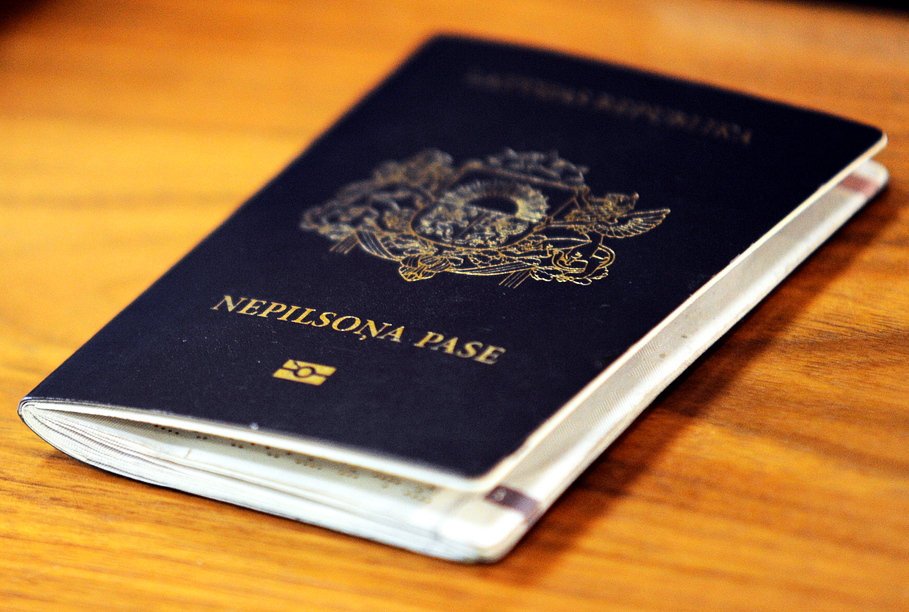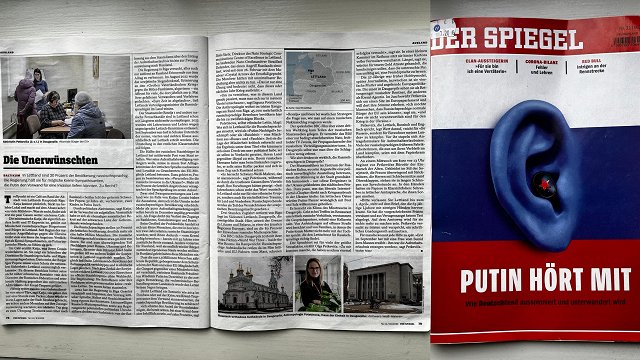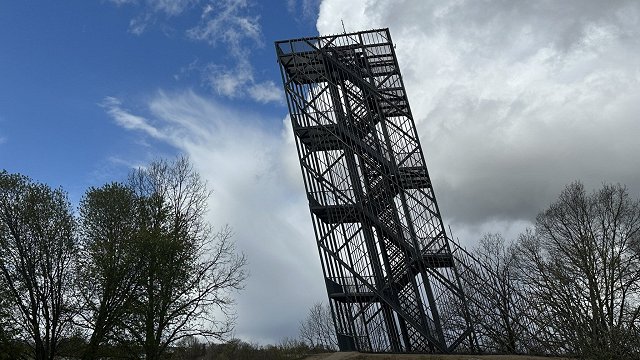First oaths and awkward moments during testing
“It was interesting in any case… I solemnly spoke the oath and it was over. The very next day we were issued our passports and I forgot all about it,” describes dance choreography teacher Aleksandrs Kolbins, who became a Latvian citizen twenty years ago. He was the very first person entrusted to speak the new citizen’s oath.
“The moment I saw the document and realized the importance of the moment, while everyone else was sitting down… I suppose my career experience on the stage led me to ask all the other people in the room to stand for the ceremony,” remembers Kolbins.
His family comes from Russia, but he himself was born in Riga. He emphasizes the fact that his entire working life has been devoted to Latvia, and he is not upset by the division of society into Latvians and Russians. He can’t even tell himself if he feels more as a Russian than as a Latvian. But there was never any question about citizenship – as soon as the opportunity came, Kolbins signed up.
Just like Aleksandrs Kolbins, so did Lithuanian Teodors Tverijonas see very clearly that he wished to remain in Latvia and become a citizen at the beginning of the 1990s.
“I had no doubts, no second thoughts, whether to do it. If I stay in Latvia, then I become a citizen, no other way around it. I no longer had any problem with the language by that point,” recalled Tverijonas.
Having moved to Latvia during the 1960s and started a family and career, later to become head of the Commercial Banking Association, Tverijonas stood before the citizenship commission in the year 1995.
“I’ll tell you, I’ve graduated from two universities and passed a lot of tests. But I have never taken such a seriously organized and strict exam as the [Latvian language and history) test in my life,” he claimed.
The tests in Latvian language and history remain in Tverijonas’ memory as bureaucratically formalized and tense, rather than difficult in content. For his 10-minute conversational Latvian test he recalled he was asked to rent a television set, not an altogether commonplace activity at the time.
“The commission role-played the rental shop workers and I was the client. Well, I rented out that TV in two minutes’ time and we ran out of things to talk about. But since this was the very first exam of its kind, the television crews were on hand to film and the unhappy commission members couldn’t just let me go, even though it was clear I had no problems with the language. So one of the members said: ‘Mr.Tverijonas, you know a lot about banks, please tell us something about [failed bank] Banka Baltija, so I took up the last seven minutes talking about that,” he recalled.
Kolbins also remembers his exam with some humor.
“So there were about seven ladies sitting there and I came in. I was still young and handsome twenty years ago. So they ask me – well, Mr.Artiste, how did you achieve this? How did you reach this profession? So I sat and told them the whole story. We forgot there were people waiting in line behind me. After about twenty minutes I said there were people waiting behind the door for their turns…”
Later it turned out that Kolbins never needed to take the language exam because he had graduated from a Latvian-language higher education institute. There were plenty of misunderstandings over the confusing regulations, which were hammered out by legislators in a great hurry at the time.
Rushed to start, politicians were unenthusiastic
The passage of the Law on Citizenship in 1994 kicked off the naturalization process with the creation of the Naturalization Board in October of that year. Eiženija Aldermane, who led the Board in the first years and is now a Riga City Council member, remembers the four-month rush to launch the process.
“The Prime Minister summoned me and asked: ‘Do you realize it’s up to you whether or not Latvia gets into the Council of Europe by next February?’
Because that was the deal – we must begin the citizenship acquisition process. The Estonians were at least a year-and-a-half ahead of us then,” recalled Aldermane.
She didn’t perceive much zeal on the part of politicians at the time, however much support came from foreign diplomatic personnel and international organizations. The former head of the Naturalization Board admitted she understood early on that it would be impossible to encompass all non-citizens in Latvia with the naturalization process.
“First of all, there was a certain negative background to the issue as such. I didn’t have the slightest doubt that would affect a large part of the non-citizen population. There was a lack of will from the ‘master of the house’ to invite people to become citizens of Latvia and to do so in a positive manner. It was clear to me that this would remain a bone of contention, and so it did,” she concluded.
In 1995 there were over 750,000 non-citizens in Latvia. The first years of naturalization were regulated by the so-called ‘naturalization windows’, which after being revoked in 1998 allowed for the process to pick up the pace.
Then, eleven years ago when Latvia joined the European Union, the naturalization process intensified even more, as non-citizens signed up on waiting lists and the number of new citizens welcomed into the nation reached 20,000 people each year.
Interest abates
Current Naturalization Board leader Igors Gorbunovs told Latvian Radio that the situation has changed again significantly since then.
“Around 2007 interest in acquiring citizenship diminished and has currently almost died out entirely. Perhaps it has to do with the fact that since 2008 non-citizens do not require visas either to European states or to Russia,” he suggested.
Last year only 939 people were issued Latvian citizenship, 90% of them former non-citizens. Contentedness with non-citizen status is one of the key reasons why the rate of naturalization has fallen so precipitously in recent years – this has been confirmed by surveys of non-citizens by the Citizenship and Migration Affairs Board (PMLP). But there are other reasons, as well, says Gorbunovs.
“There are three considerations – the belief that citizenship should be an automatic entitlement, fear of examination, and holding out for some easements of the naturalization process, though it’s clear that no such easements will ever be devised. Last year amendments to the Citizenship Law took effect and this legislation is not likely to be touched again soon,” he said.
Some fear the test; some tempted by emigration
Much to the surprise of experts, a recent 2014 survey of Riga’s minority group high schoolers showed their prime obstacle to naturalization as a lack of Latvian-language skills. Those who undertake preparations for the exam with the help of materials available on the PMLP website say their main problems are with writing and expressing themselves in conversation in Latvian.
“I speak Latvian very poorly,” admits Jelgava resident Boriss Ļeoņenko, who became a citizen last year. He arrived from Ukraine thirty years ago and had not been troubled by his non-citizen status. But a business trip to Russia finally changed his mind about attaining citizenship.
“My business partner took one look at my passport and asked – ‘What’s that mean – alien?’ That motivated me to think – I live in Latvia, maybe I don’t like everything about it, but I need to take a position. I decided – time to start learning,” explains Boris.
Last year was his first time voting for Saeima at the ballot box, but otherwise his new citizenship hasn’t altered his life much. The main benefits are not the feeling of belonging, the expanded job opportunities inside Latvia or even the right to vote so much as the chance to study, learn and work in the European Union.
On her part, Aldermane worried about the materialistic concerns of those choosing to acquire citizenship.
“I’m afraid that citizenship right now has become almost like a commodity of sorts, but it must never become like a commodity,” she said.
Has everyone who wished to, naturalized already?
Aldermane attributes the changed attitudes to the lack of integration policy, which she blames on the liquidation and subsumption of the Naturalization Board into the PMLP in 2009.
“If one small regional unit had remained in each district, it could have cooperated with local governments on this matter, which we used to do quite intensively, and that would have been an entirely different background to the process of how somebody becomes a citizen of Latvia,” she said.
The current Naturalization board’s leadership sees the solution in an individualized approach to informing society.
“That’s what we try to do. Currently all non-citizens changing their passports are told about the opportunity to naturalize. If they have young children, they can register them as citizens. We hand out informative brochures. We’ll see what the effect will be,” said Gorbunovs.
Over the course of twenty years of naturalization 142,000 people have become citizens, while the number of non-citizens was reduced by 262,000. Some have died, others have attained third-country citizenship.
“Those who needed and wanted it, could get it. Those who don’t have it now – that means that they don’t want to be citizens,” concludes Latvia’s first naturalized citizen Teodors Tverijonas.
Naturalization Board head Igors Gorbunovs estimates that it will still take about another twenty years before we will entirely have forgotten about the class of resident known as the ‘non-citizen’. In the meantime, each year more and more third-country citizens are naturalizing to become citizens of Latvia – mostly from Russia, Ukraine and Belarus, but also from China, Egypt, Burundi and other foreign nations.
































